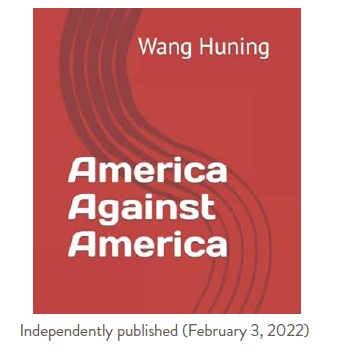In 1831, 26-year-old Alexis de Tocqueville spent ten months in America and Canada. Returning to France, he wrote Democracy in America (1835-1840), a book of observations about America and what aristocratic Europe might learn from it.
Tocqueville admired the stability of the American economy, the popularity of churches, and how the spirit of religion and liberty–the Puritan experiment–led to a “leveling of conditions” that did not exist in Europe.
But Tocqueville was not all praise. He found it ironic that even though America professed a desire for liberty and equality, Native Americans were badly mistreated, and slavery was tolerated. He was also worried about the “tyranny of the majority” in politics, whereby the newly elected drowned out the opinions of the minority.
In 1988, Wang Huning, a 33-year-old Associate Professor of International Politics at Fudan University in Shanghai and a rising star, was invited to spend six months in America as a visiting scholar. He visited over 30 cities and 20 universities. He shadowed a House of Representatives candidate in Iowa, visited a Procter & Gamble plant and the headquarters of Coca-Cola, spent time with a fisherman on the lower Mississippi, interviewed professors at MIT and the Kennedy School at Harvard, and questioned researchers at the Hoover Institution. He was in America during the Bush-Dukakis presidential contest and got a close-up view of an American presidential election.

Upon his return to China, Wang put his observations in a book, America Against America (1991). Is this the modern day version of Tocqueville? It is doubtful it will achieve anywhere near the same fame. First, it is a bit of a bizarre book. Pages are not numbered, there is no publisher listed, the translation is clunky at best (was it machine translated?), and the text is in desperate need of an editor. But the importance of this book is that the 33- year-old professor has gone on to become China’s chief idealogue (some Westerners call him “China’s Kissinger”), serving under three Communist Party chairmen and today, a member of the all-powerful seven-person Standing Committee of the Politburo.
There is probably no high government official in China with as much first-hand information on America as Wang, and certainly no one who has subsequently published his thoughts. Xi Jinping, prior to becoming Chairman in 2013, visited America only once, participating in a short agricultural group trip to Iowa in 1985.
So, what does Wang think about America? In the introduction he says his intent is to “explore the political and social management process of American society” to try to answer the question, “Why is there an America?” Although Wang is the chief of ideology and propaganda for China, he is surprisingly balanced in his appraisal of America. He sees both positives and negatives in the country, or as he calls them, “paradoxes.” He sees modern architecture and infrastructure everywhere, world class universities, innovation and technology, and a capitalistic system which he says, “cannot be underestimated.”
But at the same time, he sees problems, great wealth but also many homeless people. America has an advanced higher education system, but significant deficiencies at the elementary and secondary levels. For instance, American students know very little about geography or the rest of the world. And although America is a functioning democracy, there are powerful economic groups that can use non-political means “to determine the woes of others.” These contradictions are the reason the book is titled, America Against America.
Wang sees a crisis developing in America due to our fundamental beliefs. At the core, according to Wang, America believes in individualism, the freedom of each individual to decide for himself or herself. Personal freedom is good to an extent, but eventually it decays societal values, reduces one’s responsibility to family and country, and leads to a self-centered and very materialistic system that will eventually collapse. The Chinese Confucian core is a belief in personal loyalty, to the family, to ancestors, and to the country.
Wang’s closing chapter extols the virtues of “collectivist” Japan winning against “individualist” America. Back when Wang was writing, Japan was winning and was at peak economic power. Subsequently it went into a 30-year funk. No one today would hold it up as a winning economic model.
When Wang returned to China, he became the champion of “neoconservatism,” the idea that China needs a strong hand, politically and economically, in order to develop. In America he saw the invisible hand working, or as he said, “the political locomotive is not attached to the long train of the economy.” In China he helped build the opposite, the State’s visible hand controlling both politics and the economy. Over the long term will this be effective? The politicians and bureaucrats in Japan weren’t smart enough to make it work, and it remains to be seen whether China can.